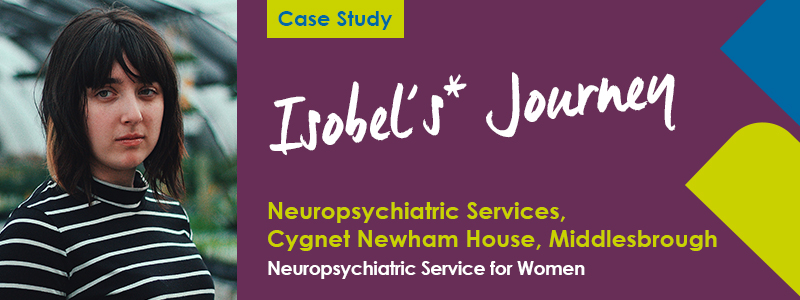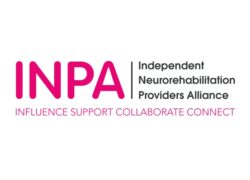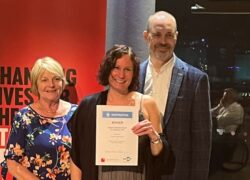
Isobel’s history
Isobel* came to Cygnet Newham House in October 2020 from a neurological rehabilitation unit after suffering a Traumatic Brain Injury (TBI) in December 2019 following a fall at home. This resulted in a subdural and subarachnoid haemorrhage. Isobel had an operation called a craniotomy which meant that part of her skull was removed.
This injury caused Isobel to have cognitive and communication difficulties and also to have a weakness on the left side of her body. As a result Isobel became agitated and frustrated. This was when Isobel was unable to communicate her needs and felt misunderstood and also when she was unable to complete her activities of daily living independently. Isobel could be both verbally and physically aggressive.
On admission
Upon admission to Cygnet Newham House, Isobel had a diagnosis of dysphasia which affects the ability to produce and understand spoken language. Isobel would struggle to understand what was being said to her and also to express what she wanted to say.
Isobel did not fully understand where she was and why and would become angry that she was unable to return home. She had a poor diet and poor sleep pattern. Initially Isobel did not want to engage in her rehabilitation programme and found it hard to build up a relationship with staff.
Isobel was supported to build up trust and to work on small goals. At first it was to encourage her to accept her medication and to accept staff support. Isobel gradually built up a daily routine however continued to be frustrated and would often shout at and hit out at others.
Isobel engaged in sessions with the therapy team to discuss aspects of her brain injury, recovery, and rehabilitation and how she felt. Staff provided Isobel with visual support to help with orientation and planning, this included the use of communication grab sheets.
Isobel’s Care
The Multi-disciplinary team (MDT) used a step by step approach to build up a relationship with Isobel, working closely with the nursing and support work team. Isobel worked with the Occupational Therapist (OT), Physiotherapist, Speech and Language Therapist (SaLT) and Psychologist. In order to build a relationship with Isobel it was important to focus on activities that were meaningful to her, for example having a coffee or accessing the community. Isobel was also supported to maintain contact with her family.
One of Isobel’s rehabilitation goals was to promote independence in activities of daily living to maintain her environment. Isobel’s view of this goal was ‘I do not want staff to do things for me and take away my skills’. Isobel was supported to engage in meaningful activities and grade them accordingly. Isobel was supported to keep her room tidy, do her laundry and to complete daily personal care such as having a shower. Initially she needed a lot of support with this but went on to become more independent and also to gain confidence in her abilities as her function improved.
Isobel gained therapeutic earnings by working alongside the Receptionist at Cygnet Newham House, participating in daily tasks such as laminating, photo copying and signing people in and out of the building. Isobel also started cooking on the unit. This started with making simple cakes alongside the staff however, she then went on to develop the skills needed to participate in shop to cook which would involve Isobel picking a recipe, writing a shopping list, purchasing the ingredients with support and then cooking the meal. When Isobel began cooking, adapted equipment such as a perching stool, spiked chopping board, dycem and an adapted knife with a built up handle were needed. This reduced over time as Isobel progressed with her rehabilitation and she no longer needed adapted equipment and had full function in the left side of her body.
Isobel enjoys participating in activities on the unit which were identified as a weakness when admitted. She enjoys utilising leave and accessing the community with staff and peers, this has also helped with Isobel’s mobility and helped increase range of movement, again this was done with a graded approach for Isobel. Isobel has been able to build positive therapeutic relationships and rapport with staff and peers within the service.
Isobel Today
With support from the team, the right medication and Isobel advocating her rehabilitation, she presents as happier and is able to manage her anger and aggression and now engages with staff and her peers. Isobel required 2:1 support at the start of her rehabilitation journey at Cygnet Newham House due to her increase in verbal and physical aggression, she is now on general observations and has had no recent incidents of aggression.
Isobel has become more independent with activities of daily living and has gone on to achieve her long term discharge plan of being placed somewhere closer to family as this is something Isobel has always identified as important to her. Isobel has been working in a local charity shop close to her new placement and has recently had a couple of overnight stays at home and is looking to be returning home full time at the end of the year. We would like to wish Isobel well for the future.
*Name has been changed to protect their identity




